Angel Time Read online
Page 6
CHAPTER FOUR
Malchiah Reveals My Life to Me
WHEN ANGELS CHOOSE A HELPER, THEY DON’T ALWAYS start at the beginning. In scanning a human being’s life, they might begin with the warm present, then move a good third of the way in, and work towards the earliest beginning and back towards the moment at hand, as they collect the data of their emotional attachment and strengthen it. And don’t ever believe anyone who tells you that we have no such emotional attachment.
Our emotions are different but we have them. We never cast a cold eye on life or death. Don’t misunderstand our seeming serenity. After all, we live in a world of perfect trust in The Maker, and we are keenly aware that humans often do not, and we feel an active sorrow for them.
But I couldn’t help but notice, as soon as I began to investigate Toby O’Dare as a boy, anxious and burdened with countless cares, that he liked nothing better than to watch on late-night television the most brutal of detective shows, and they took his mind off the hideous realities of his own crumbling world, and the firing of bullets always produced a catharsis in him just as the producers of those shows wanted to do. He learned to read early, to finish his homework in study hall, and for pleasure he read the books they call “true crime,” also, sinking easily into the well-written prose of Thomas Thompson’s Blood and Money or Serpentine.
Books on organized crime, on pathological murderers, on hideous deviants, all these he picked up from the bins of a bookstore on Magazine Street in New Orleans where he lived, though in those days he never dreamed, never for a moment, that he would one day be the subject of just that sort of story.
Loathing the glamour of evil in Silence of the Lambs, he’d thrown it in the trash. The nonfiction books weren’t written till the killer was caught, and Toby needed that resolution.
When he couldn’t sleep in the very small hours, he watched the cops and killers on the small screen, oblivious to the fact that what drove these shows was the committing of the crime, and not the sanctimonious anger and actions of the artificially heroic police lieutenant or genius detective.
But this early taste for crime fiction and fact is just about the least important thing about Toby O’Dare, so let me get back to the story to which I helped myself as soon as I fixed my inalterable gaze on him.
Toby didn’t grow up dreaming of being a killer or a cop. Toby dreamed of being a musician and saving everyone in his little family.
And what drew me to him was not the anger churning inside him and devouring him alive in this present time, or in time past. No, on that darkness I find it as hard to look, as a human might find it hard to walk into an icy winter wind that cut at his eyes and his face and froze his fingers.
What drew me to Toby was a bright and shining goodness that nothing could completely efface, a great glowing sense of right and wrong that had never been forfeit to the lie, no matter where his life had taken him.
But let me make it clear: because I choose a mortal for my purposes, that does not mean that the mortal is going to agree to come with me. Finding such a one as Toby is hard enough; persuading him to come with me is even harder. You’d think it was irresistible but it’s not. People swindle themselves out of Salvation with great regularity.
However there were too many aspects of Toby O’Dare for me to back away from him and leave him to the guardianship of lesser angels.
Toby was born in the city of New Orleans. He was of Irish and German descent. He had some Italian blood but he didn’t know it, and his great-grandmother on his father’s side was Jewish, but he didn’t know that either because he came from hardworking people who never kept track. There was some Spanish blood in him also, on his father’s side, dating from the time the Spanish Armada crashed along the coast of Ireland. And though there was talk of that as some in the family had jet-black hair and blue eyes, he never thought much about it. No one in his family ever spoke about lineage. They talked about survival.
Genealogy belongs to the rich in human history. The poor rise and fall without leaving a footprint.
Only now in the age of DNA investigation are the common people enamored of knowing their genetic makeup, and they’re not sure what to do with the information, but a revolution of sorts is happening as people seek to understand the blood that runs through their veins.
The more Toby O’Dare became the contract killer of underground fame, the less he cared about who he’d been before, or who had come before him. So as he gained the means that might have made possible an investigation into his own past, he drew further and further from the chain of humanity to which he belonged. He had after all destroyed “the past” as far as he saw it. So why should he care about what had happened long before his birth to others struggling with the same pressures and miseries?
Toby grew up in an uptown apartment, just a block away from prestigious streets, and in that dwelling there were no pictures on the walls of ancestors.
He had cherished his grandmothers, stalwart women, parents of eight children each, loving, tender, and with calloused hands. But they died when he was very young, as his parents were their youngest children.
These grandmothers were worn out from the lives they’d led and their deaths came swift, with the smallest amount of drama, in a hospital room.
Yet gigantic funerals followed, filled with cousins and flowers, and people crying because that generation, the generation of the great families, was passing from America.
Toby never forgot all those cousins, most of whom went on to great success without ever committing a crime or a sin. But by the age of nineteen, he was completely disengaged from them.
Yet the hit man now and then secretly investigated thriving marriages, and used his great computer skills to track this or that impressive career of the lawyers, judges, and priests who came from his related families. He’d played a lot with those cousins when he was a very little child, and he could not entirely forget the grandmothers who brought them together.
He’d been rocked by his grandmothers, now and then, in a big wooden chair that was sold long after their deaths to a junk dealer. He’d heard their old songs before they left the world. And now and then he sang to himself bits and pieces of them. See Saw, Marjory Daw, Catch Behind the Steam Car! or the soft tormenting melody of Go tell Aunt Rhodie, Go tell Aunt Rho oh di, the old gray goose is dead, the one she was saving for Fatty’s feather bed.
And then there were the black songs that the whites had always inherited.
Now, honey won’t you play in your own backyard, don’t mind what the white child say. For you’ve got a soul as white as snow, that’s what the Lord done say.
These were songs of a spiritual garden extant before the grandmothers departed the earth, and by eighteen Toby had turned his back on everything about his past, except the songs, of course, and the music.
Ten years ago, or at age eighteen, he left that world forever.
He simply vanished from the midst of anybody who knew him, and though none of those boys and girls or aunts or uncles blamed him for going away, they were surprised and confused by it.
They imagined him, with reason, to be a lost soul somewhere. They even imagined him mad, a street bum, a gibbering imbecile begging for his supper. That he’d taken with him a suitcase of clothes and his precious lute gave them hope, but they never saw or heard of him again.
Once or twice over the years, a search was made but, as they were searching for Toby O’Dare, a boy with a diploma from Jesuit High School and professional skill with the lute, they didn’t have the slightest chance of finding him.
One of his cousins listened quite a lot to a tape he’d made once of Toby playing on a street corner. But Toby didn’t know of this; he couldn’t possibly have known. So this potential warmth never reached him.
One of his old teachers at Jesuit High School had even searched every musical conservatory in the United States for a Toby O’Dare, but Toby O’Dare had never enrolled in any such institution.
You might say
some of this family suffered grief for the loss of the soft peculiar music of Toby O’Dare, and grief for the loss of the boy who so loved his Renaissance instrument that he would stop to explain, to anyone who asked, all about it, and why he preferred to play it on the street corner, rather than the guitar of rock star affection.
I think you see my point: his family was good stock, the O’Dares, the O’Briens, the McNamaras, the McGowens, and all those who had intermarried with them.
But in every family there are bad people, and weak people, and some people who can’t or won’t withstand the trials of life, and who fail spectacularly. Their guardian angels weep; demons beholding them dance for joy.
But only The Maker decides what ultimately happens to them.
So it was with the mother and father of Toby.
But both lines gave Toby tremendous advantages: talent for music as well as love for it was certainly the most impressive gift. But Toby inherited keen intelligence, as well, and an unusual and irrepressible sense of humor. He had a powerful imagination that enabled him to make plans, to have dreams. And a mystical bent sometimes caught hold of him. His strong desire to be a Dominican priest at the age of twelve did not pass so easily with the coming of worldly ambition, as it might have done with another teenager.
Toby never stopped going to church during the roughest high school years, and even if he’d been tempted to skip the Sunday Mass, he had his brother and sister to consider, and wouldn’t fail to set a good example.
If ever he could have only drifted back some five generations and seen his forefathers studying Torah night and day in their synagogues in Central Europe, maybe he would not have become the killer that he was. If he could have gone further back, and seen his ancestors painting pictures in Siena, Italy, perhaps he would have had more courage to pursue his most cherished designs.
But he had no idea such persons ever existed, or that on his mother’s side, generations ago, there had been English priests martyred for their faith in the time of Henry VIII, or that his great-grandfather on his father’s side, too, had wanted to be a priest but could not make the grades in school for such to be possible.
Almost no mortal on earth knows his lineage before the so-called Dark Ages, and only the great families can penetrate the deep layers of time to extract from them a series of examples that might inspire.
And the word, “inspired,” is not one to be wasted in Toby’s case, because as a contract killer, he has always been inspired. And he was inspired as a musician before that.
His success as a killer derived in no small part from the fact that tall and graceful as he was, blessed with beauty as he was, he didn’t look like anyone in particular.
By the age of twelve, he had the permanent stamp of intelligence on his features, and when he was anxious, there was something cold in his face, a look of well-established distrust. But this passed almost instantly, as it was not something he wanted to reflect, and did not want to abide in himself. He tended towards calm and people almost always found him remarkable and attractive.
He was six foot four before he graduated high school, and his blond hair had faded to an ashen color, and his level gray eyes were full of ready concentration and gentle curiosity, and gave no offense to anyone.
He frowned seldom, and when he went out for a walk, just a walk on his own, to the casual observer he appeared a bit watchful, like one eager for a plane to land on time, or someone waiting a bit anxiously for an important appointment.
If startled, he would flash with resentment and distrust, but snap away from this almost instantly. He did not want to be an unhappy or bitter person, and he had cause over the years to become both, and he resisted it mightily.
He did not drink, ever in all his life. He hated it.
From childhood on, he dressed beautifully, principally because the children in the uptown grade school to which he went dressed this way, and he wanted to be like them, and he was not above taking expensive hand-me-downs from his cousins, which included navy blue blazers and khaki trousers, and pastel polo shirts. There was a look to the boys of uptown New Orleans that was located in these very clothes and he took to discovering and cultivating it. He also tried to talk like these boys, and slowly he eliminated from his speech the strong indicators of poverty and hardness that had always marked his father’s taunts and bawling complaints and ugly threats. As for his mother’s voice, it was accentless and pleasant, and he spoke much more like her than like anyone else in his family.
He read The Official Preppy Handbook, not as a satire, but as something to be obeyed. And he knew how to roam the secondhand stores for the right kind of leather book bag.
In the parish of Holy Name of Jesus School, he walked through gloriously green streets from the St. Charles car line, and the fresh, beautifully painted houses he passed filled him with vague and dreamy longings.
Palmer Avenue uptown was his favorite street and it seemed to him at times that if he could live someday in a white two-story house on that street, he’d know perfect happiness.
He also came into contact with music very early at the Loyola Conservatory. And it was the sound of the lute, at a public Renaissance concert, that drew him away from his ardent desire to enter the priesthood.
He went from altar boy to passionate student as soon as he encountered a kindly teacher who taught him for nothing. He produced a purity of tone on the lute that astonished her. His finger work was fast, and the expression he gave to his playing was excellent, and his teacher marveled at the beautiful airs he could play by ear, and those included the songs I’ve mentioned above that always haunted him. He heard his grandmothers singing to him when he played. He played for his grandmothers sometimes in his mind. He played popular songs on the lute with great dexterity, giving them a wholly new sound, and an illusion of integrity.
At one point, one of his teachers put the records of the popular singer Roy Orbison into Toby’s hands, and he soon found he could play the slower songs of this great musician, and give them tender expression through the lute that Orbison had so accomplished with his voice. He soon knew every “ballad” that Orbison had ever recorded.
And as he rendered all popular music in his own style, he learned a classical composition for every popular song, so that he could switch back and forth between them, bringing up the rapid and contagious beauty of Vivaldi one moment, and the mournful tender suffering of Orbison the next.
His was a busy life, what with after-school study, and then the demands of the Jesuit High School curriculum. So it wasn’t so hard to keep at arm’s length the rich boys and girls he knew, for though he liked many of them very much, he was determined they were never to enter the slovenly apartment in which he lived, with two drunken parents, either of whom could hopelessly humiliate him.
He was fastidious as a child and, later on, fastidious as a killer. But in truth, he grew up afraid, a keeper of secrets, a child in permanent dread of shabby violence.
Later, as a full-blown hit man, he thrived on danger, remembering at times with amusement the television dramas he’d once loved, with the thought that he was now living something far more darkly glorious than had ever been revealed to him. While never admitting it to himself, he took some pride in his particular brand of evil. Despair might be the tune he sang to himself about what he did, but a deep polished vanity lay beneath it.
He had, in addition to this passion for the hunt, one truly precious trait which separated him completely from lesser killers. It was this: he didn’t care whether he lived or died. He didn’t believe in Hell because he didn’t believe in Heaven. He didn’t believe in the Devil because he didn’t believe in God. And though he remembered the ardent and sometimes hypnotic faith of his youth, though he respected it far more than anyone would ever have guessed, it didn’t warm his soul in the slightest.
To repeat, he had early on wanted to be a priest, and no fall from grace had taken him from that. Even when he played the lute, he prayed constantly to bring beautifu
l music from it, and he often devised new melodies for prayers that he loved.
It’s worth noting here that he had once wanted to be a saint as well. And he had wanted, young as he was, to understand the whole history of his church, and he had delighted in reading about Thomas Aquinas in particular. It seemed his teachers were always mentioning that name, and when a Jesuit priest came from the nearby university to talk to the grade school class, he told a tale of Thomas that lodged itself permanently in Toby’s memory.
It was that the great theologian Thomas had been granted a vision in his last years that caused him to turn against his earlier work, the great Summa Theologica. “It is so much straw,” said the saint to those who asked him, in vain, to continue it.
The tale was something he thought on even to the very day that he came into my relentless gaze. But he didn’t know whether it was fact or beautiful fiction. Lots of things said about the saints weren’t true. And yet that never seemed to be the point.
Sometimes, in his later ruthless and professional years, when he was tired of playing the lute, he would jot down his thoughts on these remembered things that had once meant so much to him. He conceived of a book that would shock the world: Diary of a Hit Man. Oh, he knew that others had written such memoirs but they weren’t Toby O’Dare, who still read theology when not taking down bankers in Geneva and Zurich; who, carrying a rosary, had penetrated Moscow and London long enough to commit four strategic murders within sixty-two hours. They weren’t Toby O’Dare, who had once wanted to say Mass for the multitudes.
I said he didn’t care whether he lived or died. Let me explain: he didn’t take suicide missions. He liked being alive too much to do this, though he never admitted it. Also those who worked for him did not want his body to be found at the scene of any attempted hit.
But he didn’t care, truly, whether he died today or tomorrow. And he was convinced that the world, though nothing more than the materialistic realm we can see with our own eyes, would be a lot better off without him. Sometimes he positively wanted to be dead. But these periods didn’t last long and music, above all, would bring him out of it.

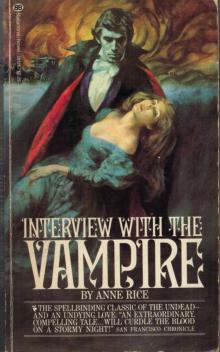 Interview with the Vampire
Interview with the Vampire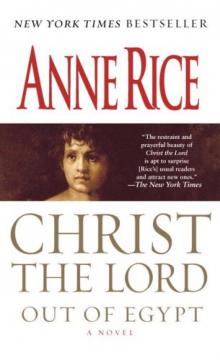 Christ the Lord: Out of Egypt
Christ the Lord: Out of Egypt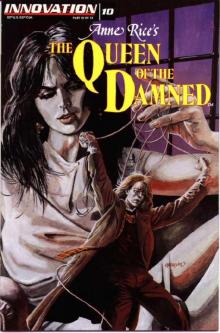 The Queen Of The Damned
The Queen Of The Damned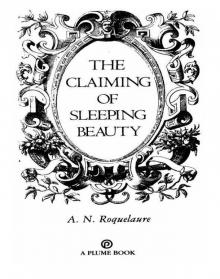 The Claiming of Sleeping Beauty
The Claiming of Sleeping Beauty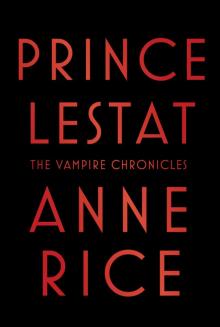 Prince Lestat
Prince Lestat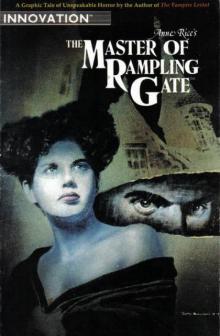 The Master of Rampling Gate
The Master of Rampling Gate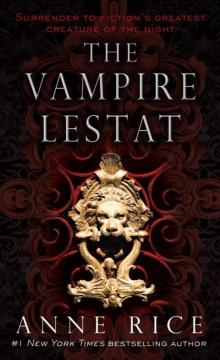 The Vampire Lestat
The Vampire Lestat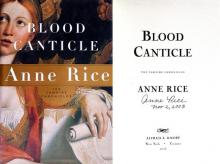 Blood Canticle
Blood Canticle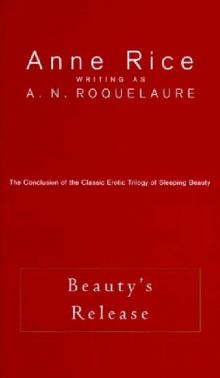 Beauty's Release
Beauty's Release Pandora
Pandora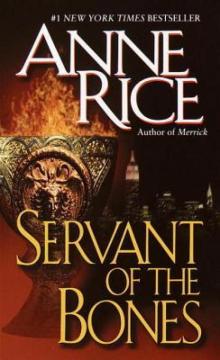 Servant of the Bones
Servant of the Bones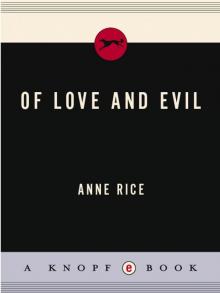 Of Love and Evil
Of Love and Evil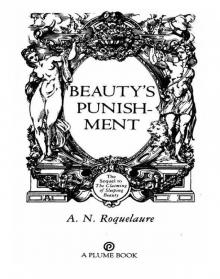 Beauty's Punishment
Beauty's Punishment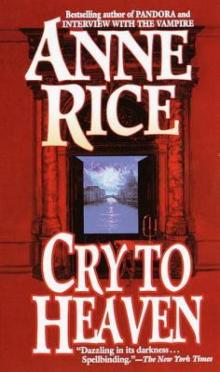 Cry to Heaven
Cry to Heaven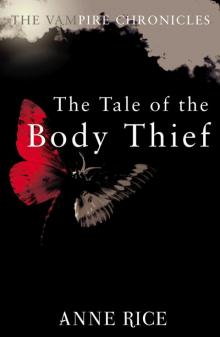 The Tale of the Body Thief
The Tale of the Body Thief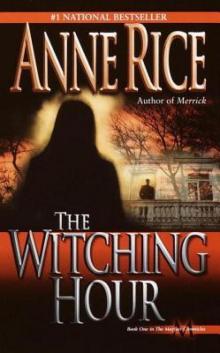 The Witching Hour
The Witching Hour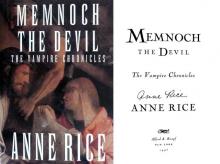 Memnoch the Devil
Memnoch the Devil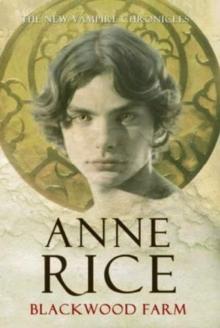 Blackwood Farm
Blackwood Farm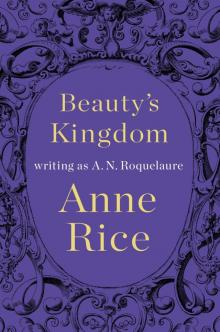 Beauty's Kingdom
Beauty's Kingdom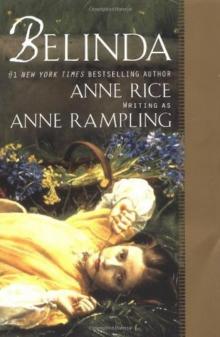 Belinda
Belinda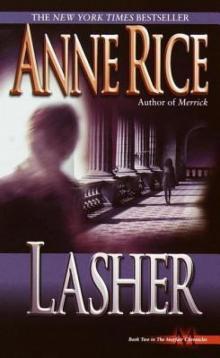 Lasher
Lasher Vittorio, the Vampire
Vittorio, the Vampire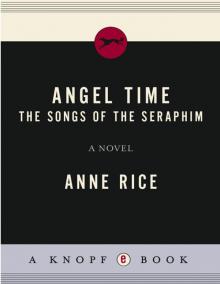 Angel Time
Angel Time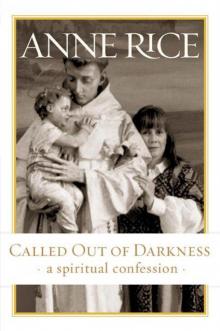 Called Out of Darkness: A Spiritual Confession
Called Out of Darkness: A Spiritual Confession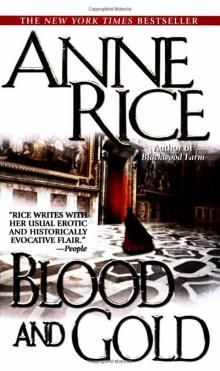 Blood And Gold
Blood And Gold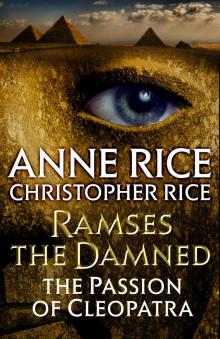 The Passion of Cleopatra
The Passion of Cleopatra Taltos
Taltos Exit to Eden
Exit to Eden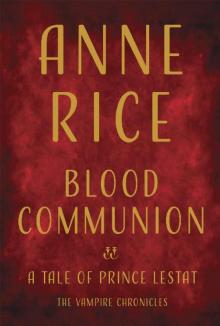 Blood Communion (The Vampire Chronicles #13)
Blood Communion (The Vampire Chronicles #13) The Wolf Gift
The Wolf Gift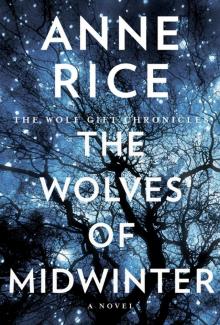 The Wolves of Midwinter
The Wolves of Midwinter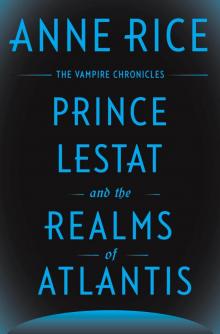 Prince Lestat and the Realms of Atlantis
Prince Lestat and the Realms of Atlantis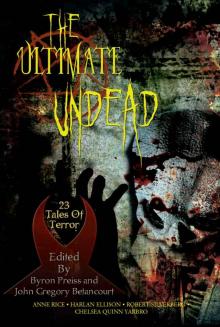 The Ultimate Undead
The Ultimate Undead The Vampire Lestat tvc-2
The Vampire Lestat tvc-2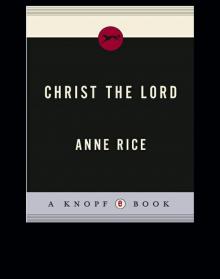 The Road to Cana
The Road to Cana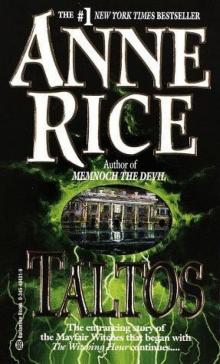 Taltos lotmw-3
Taltos lotmw-3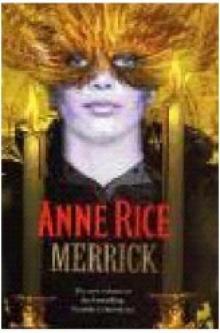 Merrick tvc-7
Merrick tvc-7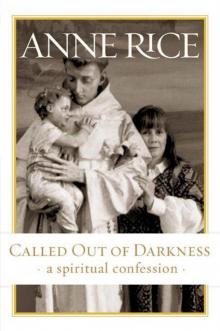 Called Out of Darkness
Called Out of Darkness Pandora - New Vampires 01
Pandora - New Vampires 01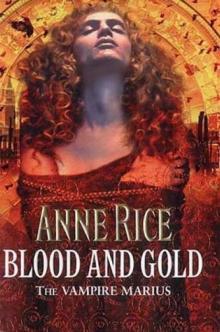 Bllod and Gold
Bllod and Gold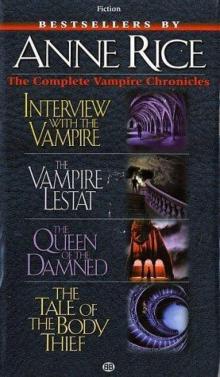 The Queen Of the Damned: Vampire Chronicles
The Queen Of the Damned: Vampire Chronicles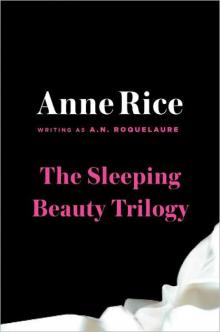 The Sleeping Beauty Trilogy
The Sleeping Beauty Trilogy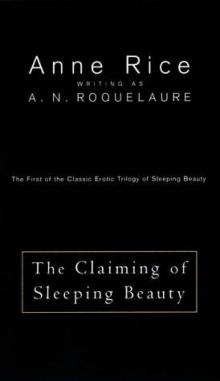 The Claiming of Sleeping Beauty b-1
The Claiming of Sleeping Beauty b-1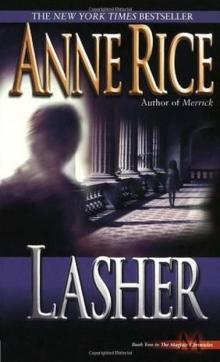 Lasher lotmw-2
Lasher lotmw-2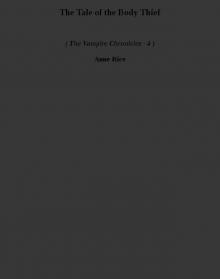 The Tale of the Body Thief tvc-4
The Tale of the Body Thief tvc-4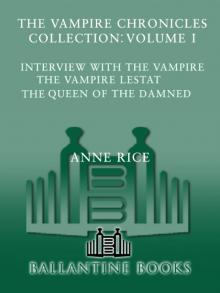 The Vampire Chronicles Collection
The Vampire Chronicles Collection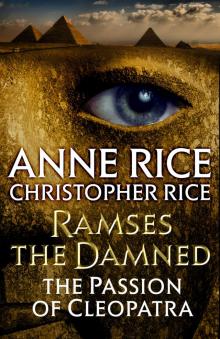 Ramses the Damned
Ramses the Damned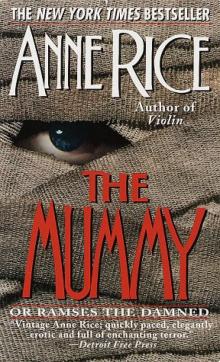 The Mummy - or Ramses the Damned
The Mummy - or Ramses the Damned Vittorio, The Vampire - New Vampires 02
Vittorio, The Vampire - New Vampires 02 The Vampire Armand tvc-6
The Vampire Armand tvc-6 Queen of the Damned tvc-3
Queen of the Damned tvc-3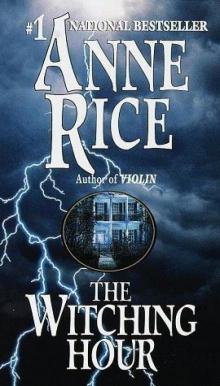 The witching hour lotmw-1
The witching hour lotmw-1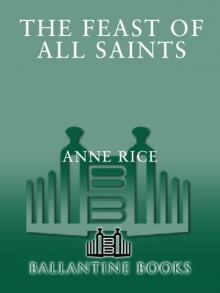 Feast of All Saints
Feast of All Saints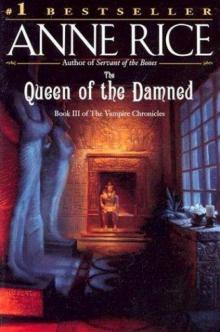 Queen of the Damned
Queen of the Damned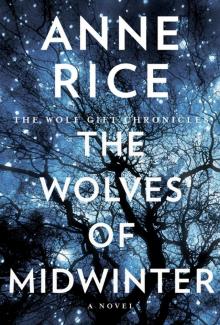 The Wolves of Midwinter twgc-2
The Wolves of Midwinter twgc-2 The Mummy
The Mummy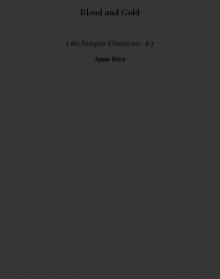 Blood and Gold tvc-8
Blood and Gold tvc-8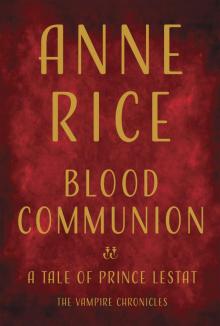 Blood Communion
Blood Communion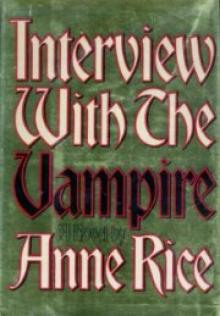 Interview with the Vampire tvc-1
Interview with the Vampire tvc-1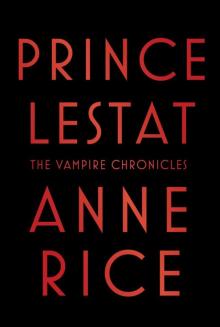 Prince Lestat: The Vampire Chronicles
Prince Lestat: The Vampire Chronicles